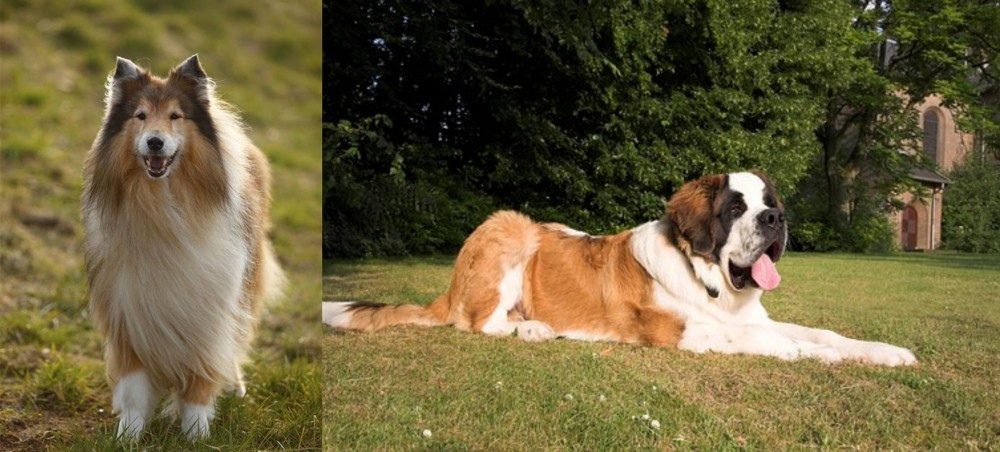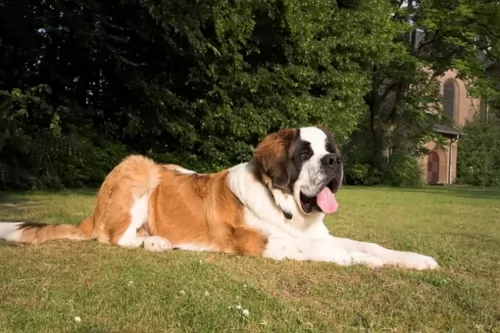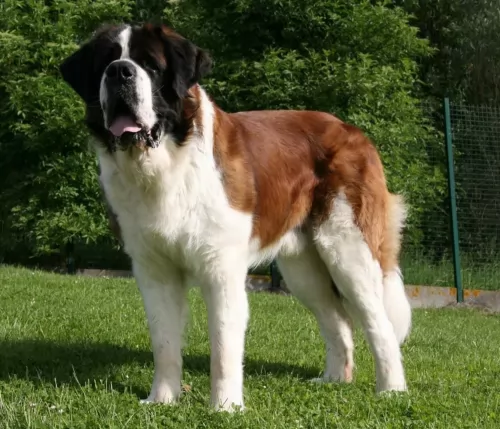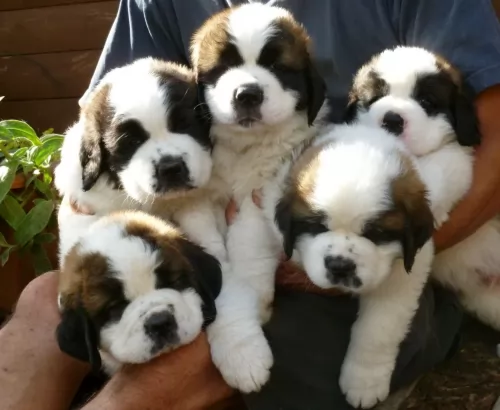 Petzlover
Petzlover Collie is originated from United Kingdom but St. Bernard is originated from Switzerland. Collie may grow 10 cm / 3 inches shorter than St. Bernard. Collie may weigh 61 kg / 134 pounds lesser than St. Bernard. Collie may live 6 years more than St. Bernard. Both Collie and St. Bernard has almost same litter size. Collie requires Moderate Maintenance. But St. Bernard requires High Maintenance
Collie is originated from United Kingdom but St. Bernard is originated from Switzerland. Collie may grow 10 cm / 3 inches shorter than St. Bernard. Collie may weigh 61 kg / 134 pounds lesser than St. Bernard. Collie may live 6 years more than St. Bernard. Both Collie and St. Bernard has almost same litter size. Collie requires Moderate Maintenance. But St. Bernard requires High Maintenance
 The Collie is a herding dog from Scotland and is also known by other names such as Rough Collie or Lassie Collie.
The Collie is a herding dog from Scotland and is also known by other names such as Rough Collie or Lassie Collie.
The first Collies used to be more in size as today’s Border Collies and they were also essentially black. Queen Victoria stepped in to save the Collie from obscurity, bringing some back to England where their popularity soared.
The looks started changing as they were bred and in 1860 they were shown at a dog show in Birmingham, England as ‘Scotch Sheep Dogs’.Later on the sable coat color was introduced.
In 1879 the first Collie was imported to the United States and a club for the dog breed was formed in 1886.
 The St Bernard breed was once called the Alpine Cattle Dogs or the Alpine Mountain Dogs. They have always been farm dogs and mountain dogs in the French and Swiss Alps. They come from the border land of Switzerland and France. They were herding dogs, hunting, search and rescue, watchdogs and draft dogs.
The St Bernard breed was once called the Alpine Cattle Dogs or the Alpine Mountain Dogs. They have always been farm dogs and mountain dogs in the French and Swiss Alps. They come from the border land of Switzerland and France. They were herding dogs, hunting, search and rescue, watchdogs and draft dogs.
Their ancestors are considered to include the Sennenhunds and molosser breeds that came to the Alps with the ancient Romans. There are four Sennenhund breeds that are believed to have contributed to the original St. Bernard. These included the Greater Swiss Mountain Dog (Grosser Schweizer Sennenhund), the Appenzeller (Appenzeller Sennenhund), the Bernese Mountain Dog (Berner Sennenhund) and the Entlebucher Mountain Dog (Entlebucher Sennenhund) Today the St. Bernard is considered a Molossoid breed.
The first we know of the St. Bernard in any written records was in 1707 at the Great St. Bernard Pass and Great St. Bernard Hospice run by monks. There were found paintings of the dogs dating back into the late 1600’s. It is told that Barry saved upward of 100 people in the St. Bernard pass, and it is from these stories that the dogs gained their snow rescue reputation.
The St. Bernard of that time did not look like the St. Bernard does today as there was much crossbreeding. Many dogs dies during rescues in the avalanches of the mid 1800’s and so they Saint was crossed with the Newfoundland to preserve the breed. You can today see the resemblance in the build and looks of the two breeds. This cross brought about the long haired St. Bernard whose fur was too heavy for rescues.
The St. Bernards of mountain rescue fame were only about the size of a German Shepherd dog and were short haired. After crossing with the Newfoundland and moving into clubs and dogs shows, they have been bred to be much larger. Before the stud book was closed, it is thought that many larger breeds such as the Greater Swiss Mountain Dog, the English Mastiff, the Tibetan Mastiff, the Rottweiler, the Great Pyrenees, the English Bulldog, the Great Dane, the Bernese Mountain Dog, the Boxer and the Caucasian Oycharka all contributed to today’s St. Bernard.
In 1884 The Swiss St. Bernard Club was founded and the breed entered the Swiss Stud book as its first entry in 1884. It was 1888 when the standard was approved and the breed became the national dog of Switzerland. Before the name St. Bernard came to be common, these dogs might be called, Barry Dogs, Alepnmastiff, Noble Steeds or Saint Dogs.
The dogs came to England in the early 1800s and to the United States soon after. They were recognized by the European kennel clubs first and by the early 1900’s they were the most popular breed in the AKC.
 The modern Collie is a medium to large sized dog that stands at 51 – 61cm and weighs between 20 – 29kg. You could say that the popularity of the Collie grew because of the dog Lassie, a Rough Collie dog in the film ‘Lassie Come Home’. People who saw this film learned what a wonderful pet the dog could be.
The modern Collie is a medium to large sized dog that stands at 51 – 61cm and weighs between 20 – 29kg. You could say that the popularity of the Collie grew because of the dog Lassie, a Rough Collie dog in the film ‘Lassie Come Home’. People who saw this film learned what a wonderful pet the dog could be.
The Collie has two looks – the full coat which is known as the Rough Collie and the shorter coated Collie known as the Smooth variety. The coat comes in different colors but is essentially tri-colored in white, tan and black tips. The Collie has erect ears and a long, feathery tail.
Temperament of a dog is affected by a number of factors, including lifestyle of owners, heredity as well as whether the dog had training and socialization.
The Collie is a good-natured, friendly dog with no aggressiveness in him. He adapts well to city and country life, so long as he is with his human family, but he will need lots of exercise.
He will do well with training and socialization, turning into an even more splendid pet than he already is. He loves the children in the home and loves playing with them and watching over them. The Collie is intelligent and loyal and is easily trained.
 Today’s St. Bernard is not a large dog, he is a giant dog. Weighing in at 140-200 pounds and standing 28 to 35 inches tall, he is a lot of dog. Bred with mastiffs and large mountain dogs, they have proportional and powerful build. They are strong, sturdy and well muscled. They have either a smooth or rough (short or long) coat. Their eyes are brown or occasionally blue. They have tight lids, and square heads and muzzles.
Today’s St. Bernard is not a large dog, he is a giant dog. Weighing in at 140-200 pounds and standing 28 to 35 inches tall, he is a lot of dog. Bred with mastiffs and large mountain dogs, they have proportional and powerful build. They are strong, sturdy and well muscled. They have either a smooth or rough (short or long) coat. Their eyes are brown or occasionally blue. They have tight lids, and square heads and muzzles.
There are two coat types called smooth and rough, or short and long. The smooth shorter coat is tough, flat and close against the body and the long, rough coat is dense, wavy and heavy around the legs, neck and ruff. Both types have long tails that hang low and are heavy. Saints are known to slobber, drool and snore.
 Your Collie is an intelligent dog who will need physical exercise as well as mental stimulation too, otherwise he can develop some destructive behavior patterns that could be avoided just by seeing to his exercise needs.
Your Collie is an intelligent dog who will need physical exercise as well as mental stimulation too, otherwise he can develop some destructive behavior patterns that could be avoided just by seeing to his exercise needs.
He is easy to train and is a sensitive dog, wanting to learn and wanting to please.
A well trained Collie makes a wonderful pet. He is such a loyal dog that he will go to the ends of the earth for his owner, and guarantees to be every bit as affectionate, brave and loyal as the film-star dog, Lassie.
 3.Adaptability no - these are giant dogs that need a lot of room. A large fenced yard or farm is best. They won’t do well in an apartment. They need exercise every day and loping around a yard is very good for them. They love to play in the snow, carry a backpack or pull a cart. They love to have a “job”
3.Adaptability no - these are giant dogs that need a lot of room. A large fenced yard or farm is best. They won’t do well in an apartment. They need exercise every day and loping around a yard is very good for them. They love to play in the snow, carry a backpack or pull a cart. They love to have a “job”
4.Learning ability – They are smart and highly trainable if motivated. They may appear lazy but they are just laid back and need a motivation.
 The Collie is a healthy dog breed generally, but just like with all other dogs, they are also prone to certain health conditions. It’s not to say that your Collie will get these diseases, but it can be beneficial to you and your pet’s health to be aware of them if you’re looking at the Collie as a pet.
The Collie is a healthy dog breed generally, but just like with all other dogs, they are also prone to certain health conditions. It’s not to say that your Collie will get these diseases, but it can be beneficial to you and your pet’s health to be aware of them if you’re looking at the Collie as a pet.
This is a condition where the skin of the nose peels and oozes and left untreated, it can be painful for your pet and could even lead to cancer.
This is an inherited eye disease that can actually lead to blindness. When certain parts of the eye don't develop properly it can lead to CEA - a genetic disease found in Collies as well as other dog breeds. The disease is also known as Choroidal Hypoplasia and brings about changes and abnormalities in the eye.
This is an abnormal formation of the hip socket and certainly dogs with hip dysplasia should never be bred as it can lead to pain and lameness.
 The first problem this breed faces is how fast they grow and gain weight. This can lead to serious health issues if not controlled. Their bones can be damaged by this excessively fast rate of growth. Other issues facing the breed include:
The first problem this breed faces is how fast they grow and gain weight. This can lead to serious health issues if not controlled. Their bones can be damaged by this excessively fast rate of growth. Other issues facing the breed include:
 The Collie will need grooming because of his long hair, and you will need to brush it at least twice a week to rid it of loose hairs and to keep it free from tangles. This is especially important if you live in the country and he leads an active lifestyle running through fields.
The Collie will need grooming because of his long hair, and you will need to brush it at least twice a week to rid it of loose hairs and to keep it free from tangles. This is especially important if you live in the country and he leads an active lifestyle running through fields.
Keep a constant check on your Collie’s ears because dirt build-up can lead to an ear infection. Your vet can advise you on how to clean your dog’s ears. Make sure you have your Collie’s nails trimmed.
To cater for your Collie’s size and activity levels, make sure to feed him good food that meets his nutritional needs. Protein is the most important nutritional need for dogs, and apart from feeding your dog quality kibble, protein should also come from raw, animal-based sources such as meat, fish and poultry.
You can also include some cooked brown rice, vegetables and cooked chicken to provide variety. Make sure he always has fresh, cool water available.
 1.Feeding the puppy – You want to control their growth. Do not overfeed, and make sure they exercise but not too much. Feed a high quality large breed puppy food 3-4 X a day in small amounts.
1.Feeding the puppy – You want to control their growth. Do not overfeed, and make sure they exercise but not too much. Feed a high quality large breed puppy food 3-4 X a day in small amounts.
2.Feeding the adult – The problem you face with he adult St. Bernard is the potential for Bloat. Don’t over feed. Don’t feed before or after strenuous exercise. Feed 2-3 X a day in smaller amounts to prevent Bloat. Feed a high quality breed specific food if possible or an extra large breed formula.
4. Games and Exercises They need exercise but not as much as you might think. The St. Bernard is a laid back lumbering character so don’t over exercise her. They enjoy weight and cart pulling but they are not athletes who enjoy frisbee or agility. Search and rescue trials and tracking trials are perfect athletic endeavors for them.